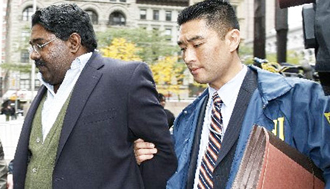Winifred Jiau, who was convicted of insider trading today, is just one more actor in an epic morality play emerging from the federal Manhattan insider trading crackdown. It just so happens that in this drama the really juicy roles on both sides of the law went to Asian Americans.
Start with the Sri Lankan-born hedge-fund manager Raj Rajaratnam who was found guilty of fraud and conspiracy by a Manhattan federal jury on May 11. He was the big fish at the center of a massive insider trading web. He retained Primary Global, a Mountain View financial research firm, to provide inside tips on tech firms so his hedge-fund could make big profits for giant investment firms like Goldman Sachs and Morgan Stanley. And of course earn fat fees. At one point Rajaratnam’s wealth was pegged at $1.3 billion.
Vietnamese American Bob Nguyen was the Primary Global employee who recruited the “consultants” from the ranks of strategically-placed executives at Silicon Valley tech firms like Google, AMD, Marvell and Nvidia. And Silicon Valley being Asian stomping grounds, many were Asians and Asian Americans. On January 11, when heat from the federal investigation became too intense, Nguyen made a plea deal to rat out fellow PG staffers like Winifred Jiau and their tipsters in exchange for sentencing slack. Nguyen’s singing helped seal the fates of Rajaratnam, Jiau and about four dozen others, most of whom were astute enough to plead guilty for lighter sentences than Rajaratnam and Jiau are likely to get.
Another key Asian American player is B. J. Kang, the square-jawed, crewcut FBI special agent who led the investigation and testified as a key witness at the Rajaratnam trial. Kang’s aggressive use of wiretaps produced tapes of 2,400 conversations that painted Rajaratnam as an avid and shameless inside trader. Kang’s sometimes shrewd tactics in getting a judge to approve those taps came under fire, but ultimately the tapes were admitted, allowing a jury to find Rajaratnam guilty of all 14 counts of conspiracy and securities fraud after two weeks of deliberation.
Yet another Asian American, Richard Choo-Beng Lee, led Kang to insider trading at SAC, a $12-billion hedge fund, triggering an avalanche of damming revelations from former SAC employees, including lurid ones by Andrew Tong who accused male supervisor Ping Jiang of forcing him to perform oral sex and to take female hormones to become “the ideal analyst/trader”, with both male and female characteristics. Tong also revealed Jiang’s scheme to profit by manufacturing false negative information about a Chinese firm in order to profit from a large short position.
Last but certainly not least among this cast of Asian American characters is Indian American Preet Bharara, the U.S. Attorney for Manhattan. It was Bharara’s determination to crack down on what he perceived to be rampant insider trading among Wall Street hedge funds and investment firms that led to the biggest insider trading roundup of at least the past quarter century.
“The message today is clear — there are rules and there are laws, and they apply to everyone, no matter who you are or how much money you have,” he said after the Rajaratnam conviction.
As someone who was born in India and came to the U.S. at the age of two, Bharara is no doubt aware of the mindset of some Asian Americans who feel they can move in channels that are too obscure and “ethnic” to be penetrated by the American legal system. Asian Americans like Kang and Bharara are aggressively helping to put that assumption to rest. At the same time they are showing that, contrary to hoary stereotypes, tough Asian Americans can play big roles on the right side of the law as well.

